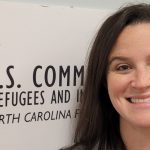USCRI Cleveland, in partnership with Educational and Cultural Ukrainian American League (ECUAL), successfully concluded a four-week Cultural Exchange Summer Camp for Ukrainian refugee and parolee children. This unique program, officially registered through the Ohio Department of Children and Youth, created a nurturing and enriching environment for children navigating a new life in the United States. […]
Category: USCRI Blog
Queering Welcome: Brazil’s Approach to LGBTQ+ Rights and Refugees
Brazil has some of the world’s strongest legal protections for queer and trans people. Since 2013, same-sex couples have had equal rights to marriage and adoption as heterosexual couples. Trans citizens can change their government identity card to reflect their lived gender identity, and do not have to vote under their dead name. These protections […]
Building Community, Sharing Culture: USCRI Offices Celebrate World Refugee Day
World Refugee Day, observed annually on June 20, is a day dedicated to honoring the strength, courage, and resilience of refugees worldwide. It’s a time to raise awareness about the challenges refugees face and to celebrate their contributions to their new communities. USCRI field offices across the country held celebrations in their communities, raising awareness […]
USCRI Joins RCUSA for 2025 Advocacy Days on Capitol Hill
This week, alongside our partners at Refugee Council USA (RCUSA), USCRI spent two impactful days on Capitol Hill meeting with members of Congress and their staff to advocate for the rights and protections of refugees and immigrants. Constituents, former refugees, and longtime advocates shared their stories, opened up crucial conversations, and called for meaningful policy […]
For Lesbians, No Refuge in the Refugee Camp
In many places, love is persecuted: 65 countries criminalize same-sex relationships. Lesbians are particularly the target of cruelty: they are often hated both for being women and for being gay. Fearing torture, internment, and even death, many seek freedom elsewhere, leaving their lives and communities behind in hopes of finding safety. Refugee camps are meant […]
Climate Solutions in Refugee Camps
Last year was the hottest year on record on our planet. This unprecedented warming and extreme climate events, like high floods, extreme drought, and raging wildfires, forced people out of their homes and displaced communities. Some of these extreme climate events affected people who were already forcibly displaced. Climate events in displacement settings have acute […]
Situation Update: Sudan April 2025
The situation in Sudan continues to deteriorate as the country approaches two years in a civil war that has caused humanitarian catastrophe. War between the Sudanese Armed Forces (SAF) and the paramilitary Rapid Support Forces (RSF) erupted on April 15, 2023. Both sides have committed atrocities. In January 2025, the U.S. Department of State determined that […]
When Accounting for War Crimes, Include Refugee Voices
Lessons from Colombia to Reckon with the Syrian Civil War What Came Before In March of 2011, the Syrian Civil War began. Bashar al-Assad’s government responded to anti-regime protests with a campaign of cruelty, razing the city of Deraa and torturing dissidents. Defectors from Assad’s forces mounted the Free Syrian Army (FSA) while jihadist […]
Timeline: Cameroon & the “Anglophone Crisis”
Cameroon is an independent country of approximately 28.3 million people located on the west coast of Africa. Cameroon borders the Gulf of Guinea, Nigeria, Chad, the Central African Republic, the Republic of the Congo, Gabon, and Equatorial Guinea. Since 2016, people in Cameroon have suffered through violent clashes between governmental security forces and separatist armed […]
Shifts in Gender-Related Refugee Protection Eligibility Guidelines
Refugee and asylum eligibility is largely determined using the “refugee” definition from the 1951 Refugee Convention and 1967 Protocol (“Refugee Convention”), which defines a refugee as a person who, “owing to well-founded fear of being persecuted for reasons of race, religion, nationality, membership of a particular social group or political opinion, is outside the country […]









































